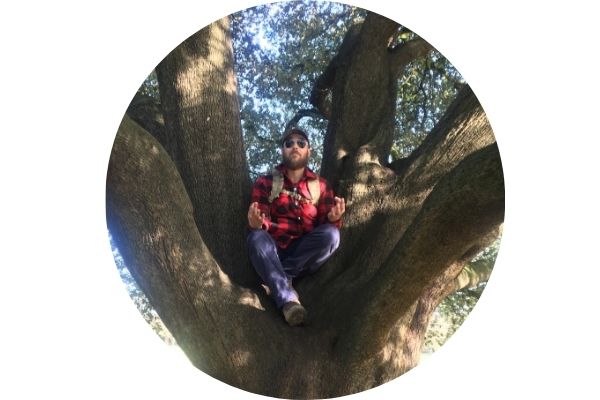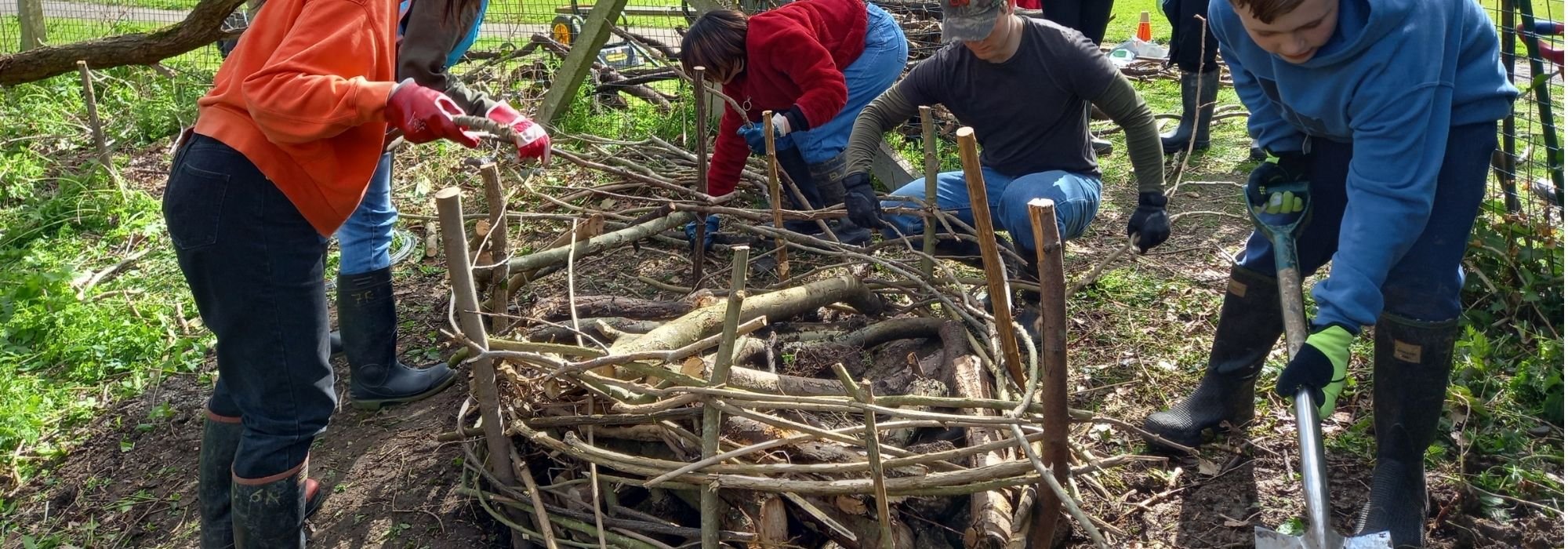Employee Spotlight on Michael O’Neill
 “I am really fond of the Cray. It makes me smile knowing that Lord Nelson used to go salmon fishing on the River Cray.”
“I am really fond of the Cray. It makes me smile knowing that Lord Nelson used to go salmon fishing on the River Cray.”
Our employees are passionate, engaged and are committed to transforming the River Thames and its tributaries. We have different skills, varied backgrounds, and individual ambitions, yet we are united by our goal to work with local communities to improve local rivers. We are united in our goal to deliver long-term environmental improvement to rivers.
Our people are the heartbeat of our company and the reason we keep inspiring communities to get ‘hands-on involved’ with their rivers. All Thames21 staff members go above and beyond the call of duty and have a ‘can do’ attitude. Communications manager Liz Gyekye and Thames21’s Helen Leary decided to catch up with one of them. Here, they sit down with Engagement Officer Michael O’Neill to find out more about him and his love for his role.
Liz Gyekye (LG): You have a varied and interesting role at Thames21. I see you doing a range of interesting things, including building specially made hedgehog houses, giving talks at community events to inspire the next generation to protect their rivers, and even helping volunteers to cut reed beds. So, what do you love most about your role at Thames21?
Michael O’Neill (MO): Wellbeing! I get a great feeling from knowing that I spend my time working for good. It is priceless Liz.
Helen Leary (HL): Speaking about volunteers, what advice would you give to someone who is interested in getting involved in one of our events?
MO: Come down. Get involved. Forget any fears or expectations. Just turn up. And within moments you’ll find your place.
HL: During your time at Thames21, have you got any interesting positive stories about the reactions you’ve received from the volunteers?
MO: I do. Perhaps, not specifics. However, I do feel that I make a lot of meaningful connections with the volunteers that come down to the events that I run regularly. This helps to build up a sense of community. I feel the connections I make benefit both me and the community – almost like a feedback loop. They make a hands on positive contribution to help their environment and I love the fact that I am giving back to the community.
LG: You seem to have a passion for giving back to the community. I want to find out a bit more about you, personally. Tell us a bit about your background?
MO: I come from a working-class background from the East End of London, where I was home schooled. Socialising didn’t come easy to me as a child because I would say that I was very shy. However, I really love people and I grew to overcome my shyness. In adulthood, I now have confidence. In my current role, having to engage with the public makes me more empathetic towards them and helps me to understand people more ‘deeply’. I also have great listening skills. That’s so important.
LG: You have an interesting background. Were you home-schooled throughout all of your childhood?
MO: Yes. I started off when I went to nursery and that was my only experience of being inside of a school institution. After that, from the age of five, I had a very interesting background. A little bit like the children in the 80s drama series ‘The Boys from the Black Stuff’ . My dad ran a bike magazine and we were up and down the country doing bike features. To be honest with you, my sister and I were a little bit like street urchins – that’s how we grew up. Yet, this was an interesting way to grow up because my dad was a very intelligent person and had high ideals. So, even though we came from quite a deprived and poor background, I think there was always a lot of intellectual debate and a lot of exchange of knowledge growing up. This really formed the majority of my education as opposed to any school curriculum.
I grew up not too far away from Bow Locks. Less than a mile from our current T21 base at Bow.
LG: Wow! So you’ve always had a connection to the river then?
MO: Yes, I have. The Thames has been a big part of my life. My grandfather (where the O’Neill comes from) lived in Mile End. So, we have been in the east end of London for more than 100 years. In fact, I’m told he helped to dig canals.
LG: So do all of your family originate from the East End?
MO: Partly. I’m actually from a mixed background. My mum had a Scottish and German heritage, and my father has Irish and Guyanese heritage.
LG: When you were home-schooled, you must have got in touch with nature. Were you outdoors a lot?
MO: I spent most of my time outdoors and was a ‘why child’. I wanted to know anything about everything. I was just curious, so I spent a lot of time picking things up off the floor. You name it, I would pick it: stones, fossils, bugs.
I have got Asperger’s Syndrome and so I became quite badly behaved anytime I got injured or stressed. If I received paper cuts or got pricked by rose thorns, I would react quite badly about it. I think that’s part of my autism. I think my senses receive a lot of information, I don’t necessarily know more than other people, but it leaves a strong impression.
So, when I was younger, I think it was really difficult to sensibly understand that process. It’s like people who are sensitive to light and going outside without glasses, everything is just too raw. I think growing up it took me a long time to understand that. And nature really helped me understand this by watching its processes.
LG: Tell us one thing that we might not know about you?
MO: As I’ve mentioned, I have Asperger’s Syndrome, which is a highly functioning type of autism and I have learnt strong behavioural mechanisms in order to control it, and hide that from people. It’s not that I hide it from people because I see it as an injury in others, it’s something that I feel in myself. If I notice people who are also on the spectrum, it’s not something that I outwardly look at as a disability but internally I do. And that’s a strange dynamic, I guess. And I try to hide it from the world.
LG: Some people with Asperger’s tend to have some special sort of skill. Of course, you have many Michael. Can you shine a spotlight on any that you can share with us?
MO: I do, facial recognition. My ability to do facial recognition probably out-competes most software. I also remember long strings of numbers very easily.
LG: What advice would you give to others with Asperger’s?
MO: Give yourself understanding, give yourself time and give yourself a break. If I were to meet anyone with Asperger’s, I would try to get them to understand something that I still don’t fully accept myself today. This is why I am my own whipping boy in that sense. I am my own worst enemy, I will judge myself more harshly than anybody else. I will put myself last in most situations. This is because I feel that is my place somehow. In essence, it’s hard to understand my needs over the recognised needs of others that I see.
HL: Taking a break is so important. River walks are a great activity to help with breaks. Do you have a favourite one?
MO: I am really fond of the Cray. It is a challenging river but I am really fond of the Cray. And when I walk down the Cray I get a good feeling. It makes me smile knowing that Lord Nelson used to go salmon fishing on the River Cray. So, when I’m out in the wilderness, those stories of the history of the place give me those nuanced layers and depth about a place and I think for that reason, the Cray is my favourite river.
HL: What is your favourite thing to do to help the environment, Michael?
MO: Teach what I know to other people. One person can’t do it all, but I believe in human beings. And so memetics is very important, I think it’s the reason we have a civilisation. Adding ideas on top of ideas and adding layers of information to pass on. I think that’s the difference that separates humanity from the animal kind, is the ability for memetic learning.
HL: You have also recently been planning a fundraising walk, inspired by Dick Whittington’s journey. Please could you tell me a little bit about that? What your plans for the walk are and what inspired you.
MO: I planned the walk two-to-three years ago, just at the start of the pandemic. For me it was a personal walk. Almost like a pilgrimage. And it was a rebirth. If you are aware of the story of Dick Whittington, he changes his life by walking to London. And so, by working for thames21, at the time it seemed fitting to join the two connections together. I chose York because various counties have quested Dick Whittington at different times, some say Gloucestershire, some say Lancashire and some say Yorkshire, I just chose York because it seemed fitting that the distance was roughly the same as the length of the Thames. It was the longer distance. So, I always try too hard in this world, so I chose the hardest route.
LG: What do you do for fun?
MO: I really like to fish. I get a huge sense of fun from surfing. I can spend the whole day not eating, exhausted, coming in on the tide. I don’t surf very well, but I enjoy it being out there in the sea. But I am also afraid of the sea. I have a healthy respect for her at least.
Anthropology fascinates me because it helps one understand how to understand one’s self.
Thank you Michael.
Would you like to volunteer for one of our community events? If yes, click on link below to find out more from our events page.
https://www.thames21.org.uk/events/
If you are a corporate group, please book with Thames21 using our corporate volunteering page.
